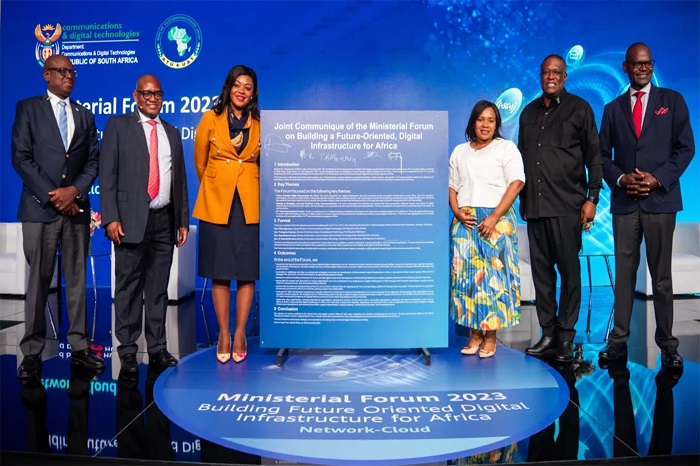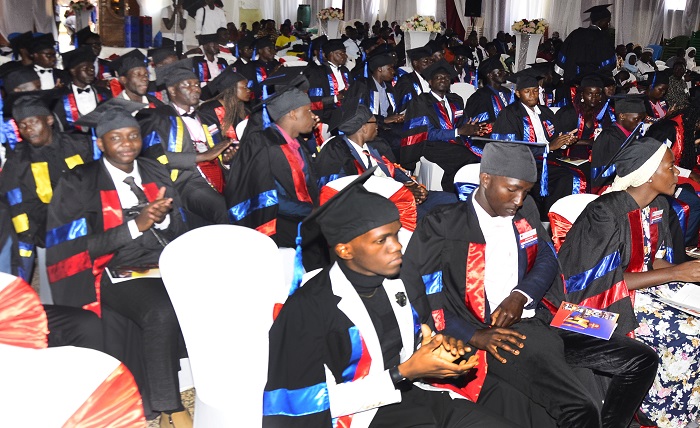
Left to right: Thulagano Merafe Segokgo, Minister of Communications, Knowledge and Technology, Republic of Botswana; Philly Mapulane, Deputy Minister of Communications & Digital Technologies, South Africa; Dr. T. A. Mavetera, Minister of Information Communication Technology, Postal and Courier Services, the Republic of Zimbabwe; Ms. Nonkqubela Thathakahle Jordan-Dyani, Director-General in the Department of Communications and Digital Technologies, South Africa; Nape Moses Nnauye, Minister for Information, Communication and Information Technology, United Republic of Tanzania and John OMO, Secretary General, African Telecommunications Union (ATU)
HABARI DAILY I Kampala, Uganda I Ministers of Communications and Digital Technologies from across Africa, joined by member states of the African Telecommunications Union (ATU), gathered in Cape Town, South Africa for the Ministerial Forum on Building a Future-Oriented, Intelligent Digital Infrastructure for Africa.
The event was co-hosted by the ATU and the Department of Communications and Digital Technologies (DCDT) of South Africa. It was aimed to catalyze the digital transformation agenda across the continent. The event concluded with the signing of a joint communique, emphasizing the pivotal role of collaboration in constructing a forward-thinking digital infrastructure for Africa.
Conducted alongside AfricaCom, the continent’s premier ICT conference and exhibition, the forum provided a vital platform for dialogue and knowledge exchange on the development of a future-oriented intelligent digital infrastructure. This infrastructure is recognized as indispensable for realizing the socio-economic development goals set for the continent.
In an era where the global digital economy places significant emphasis on high-speed networks (4G, 5G, and fiber) and the implementation of high-performance cloud computing capabilities, the forum aimed to address these imperatives. The discussions sought to foster consensus among stakeholders on the direction for building a future-oriented digital infrastructure for Africa.
John Omo, Secretary General of the African Telecommunications Union (ATU), underscored the pivotal role of digital infrastructure in global progress and stressed the need for deliberate actions to safeguard Africa’s future. Omo emphasized the importance of inclusivity, asserting that technological advancements should reach every corner of society.
Philly Mapulane, South African Deputy Minister of Communications and Digital Technologies, echoed the call for collaboration, stating, “This gathering marks a significant milestone in our collective pursuit of a digitally empowered Africa.” He emphasized that the forum represented architects of a shared vision, envisioning an Africa propelled into a future where connectivity possibilities are boundless.
Leo Chen, President of Huawei Sub-Saharan Africa, highlighted the progress made in building the necessary digital infrastructure while outlining areas that require improvement. Chen advocated for the One Network, One Cloud approach, asserting that it would lead to considerable benefits, including increased GDP, enhanced government service delivery, and improved connectivity for households.
Chen explained that to build One Network, countries should focus on constructing national broadband backbone networks, serving as the foundation for national network connectivity. These backbone networks should be extensible across multiple domains, connecting metropolitan area networks and campus networks.
Addressing the “One Cloud” segment, Chen underscored the importance of cloud technologies at a national level. He envisioned national cloud platforms as foundations for a country’s technological innovation and capabilities, citing examples from China’s experience.
The joint communique issued at the end of the forum committed African countries to collaborate and align policies and strategies in promoting digital infrastructure development in line with the African Union Agenda 2063, the ATU Strategic Plan 2020-2024, and the United Nations Sustainable Development Goals.
Dignitaries from various African countries echoed the importance of collaboration for the future of digital infrastructure. Thulagano Merafe Segokgo from Botswana emphasized the need to work collectively to prevent connection costs from becoming a barrier to connectivity.
Nape Moses Nnauye from Tanzania stressed collaboration in facing challenges, while Dr. T A Mavetera from Zimbabwe called for broader collaboration beyond digital infrastructure, including skills transfer and policy formulation.
The forum also featured the presentation of the South African Fibre Broadband Development Initiative, highlighting efforts toward a gigabit society in South Africa. The initiative, a partnership between DCDT, Digital Council Africa, and Africa Analysis, presented a position paper titled “Toward a Gigabit Society in South Africa,” analyzing the impact of increased fixed broadband adoption on social and economic perspectives and proposing recommendations for strategy and policy interventions



